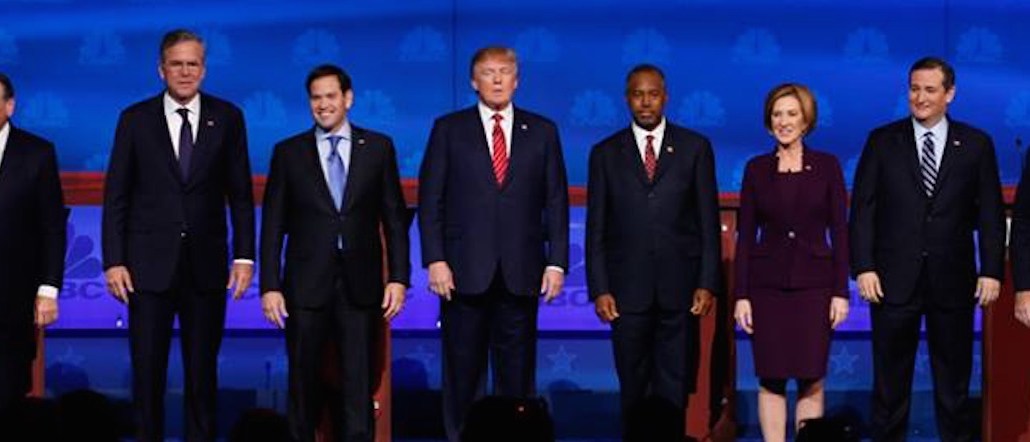‘Total trainwreck:’ CNBC moderators blasted online for GOP debate meddling

If there was one clear loser in last night’s Republican presidential debate, it was CNBC: The business network was lashed online for its chaotic format and biased questions during the GOP showdown.
From the very beginning, CNBC caught the Internet’s ire because its moderators — Becky Quick, Carl Quintanilla and John Harwood — spent the first 15 minutes mindlessly making small talk instead of introducing the candidates.
“CNBC does underscore that the only people sometimes more vapid than candidates are journalists talking about candidates,” tweeted New York Times columnist Nicholas Kristof.
And it was all downhill from there. If you missed the two-and-a-half-hour debate, the one Vine perfectly encompasses the madness:
The candidates’ anger boiled over throughout the debate, taking the trio of moderators to task for not keeping the other presidential hopefuls in line. Comparing it to a “cage match,” Texas senator Ted Cruz blasted Hardwood’s questions:
“Look at the questions: ‘Donald Trump, are you a comic book villain?’ ‘Ben Carson, can you do math?’ ‘John Kasich, will you insult two people over here?’ ‘Marco Rubio, why don’t you resign?’ ‘Jeb Bush, why have your numbers fallen?’ How about talking about the substantive issues people care about?”
Yikes! The rest of the debate followed the same pitter-patter of candidates complaining and, at times, the audience booing the CNBC hosts. People at home voiced their annoyance online:
I thought @CNBC moderators were meant to moderate while candidates debate. Too many news outlets, too few qualified news people. #GOPDebate — Donnie Wahlberg (@DonnieWahlberg) October 29, 2015
Big failing of the CNBC mods was that they were not prepared for candidates to blatantly lie about things they had said & done in the past
— Dan Primack (@danprimack) October 29, 2015
Cannot remember a debate that was so poorly moderated, w/as many inane and irrelevant Qs. Missed opportunity for @CNBC — West Wing Reports (@WestWingReport) October 29, 2015
Becky Quick was actually correct in what Trump said. But she didn’t have the data ready, Anderson Cooper style, to back herself up.
— Ashley Parker (@AshleyRParker) October 29, 2015
Twitter isn’t a reliable indicator of sentiment but tonight I think offers a roadmap of columns to come: CNBC is going to get crushed. — Richard Deitsch (@richarddeitsch) October 29, 2015
Amobee Brand Intelligence measured 1,800,000 million tweets, with the most tweeted about moment (200,151) when Cruz went after CNBC. Overall, at “no point did sentiment toward the network turn positive,” said Brandwatch analyst Kellan Terry. That’s a complete reversal from CNN’s handling of its most recent Democratic Debate when it measured a 62 percent positive rate.
This morning, the anger was still palpable. Slate said CNBC was the “biggest loser” of its own debate, ThinkProgress called it a “total trainwreck” and the Washington Post plainly stated that CNBC had a “really bad debate night.” Even the chairman of the Republican National Committee, Reince Priebus, tweeted the network “should be ashamed of how this debate was handled.”
CNBC held firm against the rhetoric, releasing a statement saying “people who want to be President of the United States should be able to answer tough questions.”
Neil Cavuto and the gang at Fox Business Network, which is hosting the next Republican debate, got the last word in:
RETWEET if you think @FoxBusiness and @WSJ will put on a better debate than this #GOPDebate pic.twitter.com/d2m4ut6W3M
— Neil Cavuto (@TeamCavuto) October 29, 2015
So far, it has 1,700 retweets but the bar, as one person pointed out, isn’t “very high.”
Images via CNBC on Facebook.
More in Media

Digiday+ Research: Dow Jones, Business Insider and other publishers on AI-driven search
This report explores how publishers are navigating search as AI reshapes how people access information and how publishers monetize content.

In Graphic Detail: AI licensing deals, protection measures aren’t slowing web scraping
AI bots are increasingly mining publisher content, with new data showing publishers are losing the traffic battle even as demand grows.

In Graphic Detail: The scale of the challenge facing publishers, politicians eager to damage Google’s adland dominance
Last year was a blowout ad revenue year for Google, despite challenges from several quarters.





